- Home
- David Sedaris
When You Are Engulfed in Flames Page 2
When You Are Engulfed in Flames Read online
Page 2
The last time this happened we were in Australia, where I’d gone to attend a conference. Hugh had all the free time in the world, but mine was limited to four hours on a Saturday morning. There’s a lot to do in Sydney, but first on my list was a visit to the Taronga Zoo, where I hoped to see a dingo. I never saw that Meryl Streep movie, and as a result the creature was a complete mystery to me. Were someone to say, “I left my window open and a dingo flew in,” I would have believed it, and if he said, “Dingoes! Our pond is completely overrun with them,” I would have believed that as well. Two-legged, four-legged, finned, or feathered: I simply had no idea, which was exciting, actually, a rarity in the age of twenty-four-hour nature channels. Hugh offered to draw me a picture, but, having come this far, I wanted to extend my ignorance just a little bit longer, to stand before the cage or tank and see this thing for myself. It would be a glorious occasion, and I didn’t want to spoil it at the eleventh hour. I also didn’t want to go alone, and this was where our problem started.
Hugh had spent most of his week swimming and had dark circles beneath his eyes, twin impressions left by his goggles. When in the ocean, he goes out for hours, passing the lifeguard buoys and moving into international waters. It looks as though he’s trying to swim home, which is embarrassing when you’re the one left on shore with your hosts. “He honestly does like it here,” I say. “Really.”
Had it been raining, he might have willingly joined me, but, as it was, Hugh had no interest in dingoes. It took a solid hour of whining to change his mind, but even then his heart wasn’t in it. Anyone could see that. We took a ferry to the zoo, and while on board he stared longingly at the water and made little paddling motions with his hands. Every second wound him tighter, and when we landed I literally had to run to keep up with him. The koala bears were just a blur, as were the visitors who stood before them, posing for photos. “Can’t we just . . . ,” I wheezed, but Hugh was rounding the emus and couldn’t hear me.
He has the most extraordinary sense of direction I’ve ever seen in a mammal. Even in Venice, where the streets were seemingly designed by ants, he left the train station, looked once at a map, and led us straight to our hotel. An hour after checking in he was giving directions to strangers, and by the time we left he was suggesting shortcuts to gondoliers. Maybe he smelled the dingoes. Maybe he’d seen their pen from the window of the plane, but, whatever his secret, he ran right to them. I caught up a minute later and bent from the waist to catch my breath. Then I covered my face, stood upright, and slowly parted my fingers, seeing first a fence and then, behind it, a shallow moat filled with water. I saw some trees — and a tail — and then I couldn’t stand it anymore and dropped my hands.
“Why, they look just like dogs,” I said. “Are you sure we’re in the right place?”
Nobody answered, and I turned to find myself standing beside an embarrassed Japanese woman. “I’m sorry,” I said. “I thought you were the person I brought halfway around the world. First-class.”
A zoo is a good place to make a spectacle of yourself, as the people around you have creepier, more photogenic things to look at. A gorilla pleasures himself while eating a head of iceberg lettuce, and it’s much more entertaining than the forty-something-year-old man who dashes around talking to himself. For me, that talk is always the same, a rehearsal of my farewell speech: “. . . because this time, buddy, it’s over. I mean it.” I imagine myself packing a suitcase, throwing stuff in without bothering to fold it. “If you find yourself missing me, you might want to get a dog, an old, fat one that can run to catch up and make that distant panting sound you’ve grown so accustomed to. Me, though, I’m finished.”
I will walk out the door and never look back, never return his calls, never even open his letters. The pots and pans, all the things that we acquired together, he can have them, that’s how unfeeling I will be. “Clean start,” that’s my motto, so what do I need with a shoe box full of photographs, or the tan-colored belt he gave me for my thirty-third birthday, back when we first met and he did not yet understand that a belt is something you get from your aunt, and not your boyfriend, I don’t care who made it. After that, though, he got pretty good in the gift-giving department: a lifelike mechanical hog covered in real pigskin, a professional microscope offered at the height of my arachnology phase, and, best of all, a seventeenth-century painting of a Dutch peasant changing a dirty diaper. Those things I would keep — and why not? I’d also take the desk he gave me, and the fireplace mantel, and, just on principle, the drafting table, which he clearly bought for himself and tried to pass off as a Christmas present.
Now it seemed that I would be leaving in a van rather than on foot, but, still, I was going to do it, so help me. I pictured myself pulling away from the front of our building, and then I remembered that I don’t drive. Hugh would have to do it for me, and well he should after everything he’d put me through. Another problem was where this van might go. An apartment, obviously, but how would I get it? It’s all I can do to open my mouth at the post office, so how am I going to talk to a real estate agent? The language aspect has nothing to do with it, as I’m no more likely to house-hunt in New York than I am in Paris. When discussing sums over sixty dollars, I tend to sweat. Not just on my forehead, but all over. Five minutes at the bank, and my shirt is transparent. Ten minutes, and I’m stuck to my seat. I lost twelve pounds getting the last apartment, and all I had to do was sign my name. Hugh handled the rest of it.
On the bright side, I have money, though I’m not exactly sure how to get my hands on it. Bank statements arrive regularly, but I don’t open anything that’s not personally addressed or doesn’t look like a free sample. Hugh takes care of all that, opening the icky mail and actually reading it. He knows when our insurance payments are due, when it’s time to renew our visas, when the warranty on the washer is about to expire. “I don’t think we need to extend this,” he’ll say, knowing that if the machine stops working he’ll fix it himself, the way he fixes everything. But not me. If I lived alone and something broke, I’d just work around it: use a paint bucket instead of a toilet, buy an ice chest and turn the dead refrigerator into an armoire. Call a repairman? Never. Do it myself? That’ll be the day.
I’ve been around for nearly half a century, yet still I’m afraid of everything and everyone. A child sits beside me on a plane and I make conversation, thinking how stupid I must sound. The downstairs neighbors invite me to a party and, after claiming that I have a previous engagement, I spend the entire evening confined to my bed, afraid to walk around because they might hear my footsteps. I do not know how to turn up the heat, send an e-mail, call the answering machine for my messages, or do anything even remotely creative with a chicken. Hugh takes care of all that, and when he’s out of town I eat like a wild animal, the meat still pink, with hair or feathers clinging to it. So is it any wonder that he runs from me? No matter how angry I get, it always comes down to this: I’m going to leave and then what? Move in with my dad? Thirty minutes of pure rage, and when I finally spot him I realize that I’ve never been so happy to see anyone in my life.
“There you are,” I say. And when he asks where I have been, I answer honestly and tell him I was lost.
The Understudy
In the spring of 1967, my mother and father went out of town for the weekend and left my four sisters and me in the company of a woman named Mrs. Byrd, who was old and black and worked as a maid for one of our neighbors. She arrived at our house on a Friday afternoon, and, after carrying her suitcase to my parents’ bedroom, I gave her a little tour, the way I imagined they did in hotels. “This is your TV, this is your private sundeck, and over here you’ve got a bathroom — just yours and nobody else’s.”
Mrs. Byrd put her hand to her cheek. “Somebody pinch me. I’m about to fall out.”
She cooed again when I opened a dresser drawer and explained that when it came to coats and so forth we favored a little room called a closet. “There are two of them against the wall
there, and you can use the one on the right.”
It was, I thought, a dream for her: your telephone, your massive bed, your glass-doored shower stall. All you had to do was leave it a little cleaner than you found it.
A few months later, my parents went away again and left us with Mrs. Robbins, who was also black, and who, like Mrs. Byrd, allowed me to see myself as a miracle worker. Night fell, and I pictured her kneeling on the carpet, her forehead grazing my parents’ gold bedspread. “Thank you, Jesus, for these wonderful white people and all that they have given me this fine weekend.”
With a regular teenage babysitter, you horsed around, jumped her on her way out of the bathroom, that sort of thing, but with Mrs. Robbins and Mrs. Byrd we were respectful and well behaved, not like ourselves at all. This made our parents’ getaway weekend a getaway for us as well — for what was a vacation but a chance to be someone different?
In early September of that same year, my parents joined my aunt Joyce and uncle Dick for a week in the Virgin Islands. Neither Mrs. Byrd nor Mrs. Robbins was available to stay with us, and so my mother found someone named Mrs. Peacock. Exactly where she found her would be speculated on for the remainder of our childhoods.
“Has Mom ever been to a women’s prison?” my sister Amy would ask.
“Try a man’s prison,” Gretchen would say, as she was never convinced that Mrs. Peacock was a legitimate female. The “Mrs.” part was a lie anyway, that much we knew.
“She just says she was married so people will believe in her!!!!” This was one of the insights we recorded in a notebook while she was staying with us. There were pages of them, all written in a desperate scrawl, with lots of exclamation points and underlined words. It was the sort of writing you might do when a ship was going down, the sort that would give your surviving loved ones an actual chill. “If only we’d known,” they’d moan. “Oh, for the love of God, if only we had known.”
But what was there to know, really? Some fifteen-year-old offers to watch your kids for the night and, sure, you ask her parents about her, you nose around. But with a grown woman you didn’t demand a reference, especially if the woman was white.
Our mother could never remember where she had found Mrs. Peacock. “A newspaper ad,” she’d say, or, “I don’t know, maybe she sat for someone at the club.”
But who at the club would have hired such a creature? In order to become a member you had to meet certain requirements, one of them being that you did not know people like Mrs. Peacock. You did not go to places where she ate or worshipped, and you certainly didn’t give her the run of your home.
I smelled trouble the moment her car pulled up, a piece of junk driven by a guy with no shirt on. He looked just old enough to start shaving, and remained seated as the figure beside him pushed open the door and eased her way out. This was Mrs. Peacock, and the first thing I noticed was her hair, which was the color of margarine and fell in waves to the middle of her back. It was the sort of hair you might find on a mermaid, completely wrong for a sixty-year-old woman who was not just heavy but fat, and moved as if each step might be her last.
“Mom!” I called, and, as my mother stepped out of the house, the man with no shirt backed out of the driveway and peeled off down the street.
“Was that your husband?” my mother asked, and Mrs. Peacock looked at the spot where the car had been.
“Naw,” she said. “That’s just Keith.”
Not “my nephew Keith” or “Keith, who works at the filling station and is wanted in five states,” but “just Keith,” as if we had read a book about her life and were expected to remember all the characters.
She’d do this a lot over the coming week, and I would grow to hate her for it. Someone would phone the house, and after hanging up she’d say, “So much for Eugene” or “I told Vicky not to call me here no more.”
“Who’s Eugene?” we’d ask. “What did Vicky do that was so bad?” And she’d tell us to mind our own business.
She had this attitude, not that she was better than us but that she was as good as us — and that simply was not true. Look at her suitcase, tied shut with rope! Listen to her mumble, not a clear sentence to be had. A polite person would express admiration when given a tour of the house, but aside from a few questions regarding the stovetop Mrs. Peacock said very little and merely shrugged when shown the master bathroom, which had the word “master” in it and was supposed to make you feel powerful and lucky to be alive. I’ve seen better, her look seemed to say, but I didn’t for one moment believe it.
The first two times my parents left for vacation, my sisters and I escorted them to the door and said that we would miss them terribly. It was just an act, designed to make us look sensitive and English, but on this occasion we meant it. “Oh, stop being such babies,” our mother said. “It’s only a week.” Then she gave Mrs. Peacock the look meaning “Kids. What are you going to do?”
There was a corresponding look that translated to “You tell me,” but Mrs. Peacock didn’t need it, for she knew exactly what she was going to do: enslave us. There was no other word for it. An hour after my parents left, she was lying facedown on their bed, dressed in nothing but her slip. Like her skin, it was the color of Vaseline, an uncolor really, which looked even worse with yellow hair. Add to this her great bare legs, which were dimpled at the inner knee and streaked throughout with angry purple veins.
My sisters and I attempted diplomacy. “Isn’t there, perhaps, some work to be done?”
“You there, the one with the glasses.” Mrs. Peacock pointed at my sister Gretchen. “Your mama mentioned they’s some sodie pops in the kitchen. Go fetch me one, why don’t you.”
“Do you mean Coke?” Gretchen asked.
“That’ll do,” Mrs. Peacock said. “And put it in a mug with ice in it.”
While Gretchen got the Coke, I was instructed to close the drapes. It was, to me, an idea that bordered on insanity, and I tried my best to talk her out of it. “The private deck is your room’s best feature,” I said. “Do you really want to block it out while the sun’s still shining?”
She did. Then she wanted her suitcase. My sister Amy put it on the bed, and we watched as Mrs. Peacock untied the rope and reached inside, removing a plastic hand attached to a foot-long wand. The business end was no bigger than a monkey’s paw, the fingers bent slightly inward, as if they had been frozen in the act of begging. It was a nasty little thing, the nails slick with grease, and over the coming week we were to see a lot of it. To this day, should any of our boyfriends demand a back-scratch, my sisters and I recoil. “Brush yourself against a brick wall,” we say. “Hire a nurse, but don’t look at me. I’ve done my time.”
No one spoke of carpal tunnel syndrome in the late 1960s, but that doesn’t mean it didn’t exist. There just wasn’t a name for it. Again and again we ran the paw over Mrs. Peacock’s back, the fingers leaving white trails and sometimes welts. “Ease up,” she’d say, the straps of her slip lowered to her forearms, the side of her face mashed flat against the gold bedspread. “I ain’t made of stone, you know.”
That much was clear. Stone didn’t sweat. Stone didn’t stink or break out in a rash, and it certainly didn’t sprout little black hairs between its shoulder blades. We drew this last one to Mrs. Peacock’s attention, and she responded, saying, “Y’all’s got the same damn thing, only they ain’t poked out yet.”
That one was written down verbatim and read aloud during the daily crisis meetings my sisters and I had taken to holding in the woods behind our house. “Y’all’s got the same damn thing, only they ain’t poked out yet.” It sounded chilling when said in her voice, and even worse when recited normally, without the mumble and the country accent.
“Can’t speak English,” I wrote in the complaint book. “Can’t go two minutes without using the word ‘damn.’ Can’t cook worth a damn hoot.”
The last part was not quite true, but it wouldn’t have hurt her to expand her repertoire. Sloppy joe, sloppy joe, sloppy joe,
held over our heads as if it were steak. Nobody ate unless they earned it, which meant fetching her drinks, brushing her hair, driving the monkey paw into her shoulders until she moaned. Mealtime came and went — her too full of Coke and potato chips to notice until one of us dared to mention it. “If y’all was hungry, why didn’t you say nothing? I’m not a mind reader, you know. Not a psychic or some damn thing.”
Then she’d slam around the kitchen, her upper arms jiggling as she threw the pan on the burner, pitched in some ground beef, shook ketchup into it.
My sisters and I sat at the table, but Mrs. Peacock ate standing, like a cow, we thought, a cow with a telephone: “You tell Curtis for me that if he don’t run Tanya to R.C.’s hearing, he’ll have to answer to both me and Gene Junior, and that’s no lie.”
Her phone calls reminded her that she was away from the action. Events were coming to a head: the drama with Ray, the business between Kim and Lucille, and here she was, stuck in the middle of nowhere. That’s how she saw our house: the end of the earth. In a few years’ time, I’d be the first to agree with her, but when I was eleven, and you could still smell the fresh pine joists from behind the Sheetrocked walls, I thought there was no finer place to be.
“I’d like to see where she lives,” I said to my sister Lisa.
And then, as punishment, we did see.
This occurred on day five, and was Amy’s fault — at least according to Mrs. Peacock. Any sane adult, anyone with children, might have taken the blame upon herself. Oh, well, she would have thought. It was bound to happen sooner or later. Seven-year-old girl, her arm worn to rubber after hours of back-scratching, carries the monkey paw into the master bathroom, where it drops from her hand and falls to the tile floor. The fingers shatter clean off, leaving nothing — a jagged little fist at the end of a stick.
“Now you done it,” Mrs. Peacock said. All of us to bed without supper. And the next morning Keith pulled up, still with no shirt on. He honked in the driveway, and she shouted at him through the closed door to hold his damn horses.

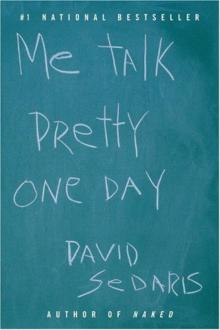 Me Talk Pretty One Day
Me Talk Pretty One Day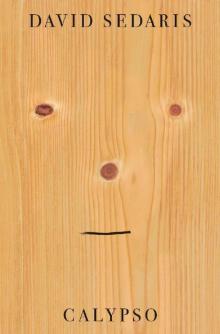 Calypso
Calypso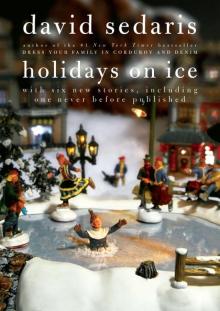 Holidays on Ice
Holidays on Ice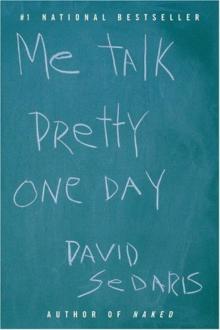 Mi vida en rose
Mi vida en rose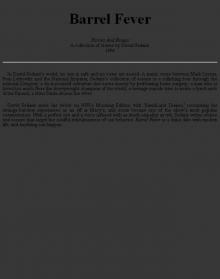 1994 - Barrel Fever
1994 - Barrel Fever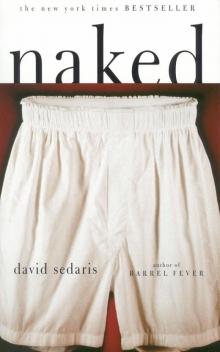 Naked
Naked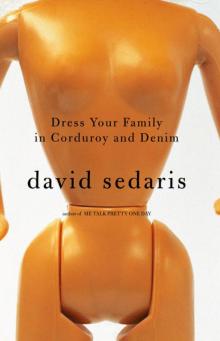 Dress Your Family in Corduroy and Denim
Dress Your Family in Corduroy and Denim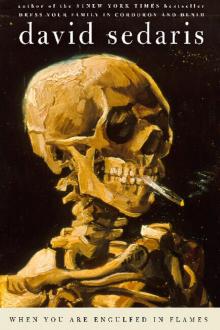 When You Are Engulfed in Flames
When You Are Engulfed in Flames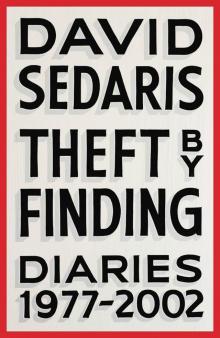 Theft by Finding: Diaries 1977-2002
Theft by Finding: Diaries 1977-2002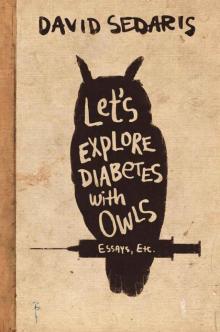 Let's Explore Diabetes With Owls
Let's Explore Diabetes With Owls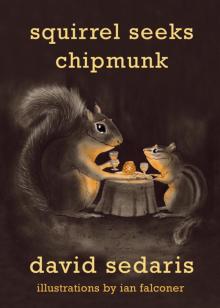 Squirrel Seeks Chipmunk: A Modest Bestiary
Squirrel Seeks Chipmunk: A Modest Bestiary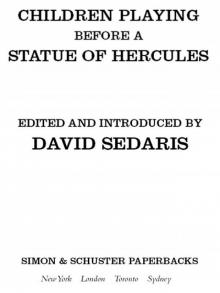 Children Playing Before a Statue of Hercules
Children Playing Before a Statue of Hercules The Best of Me
The Best of Me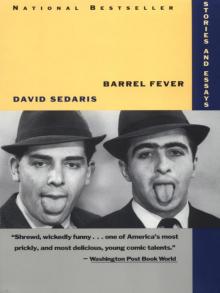 Barrel Fever
Barrel Fever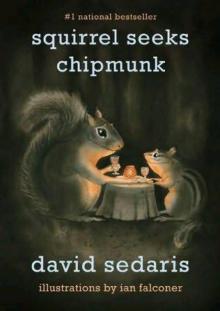 Squirrel Seeks Chipmunk
Squirrel Seeks Chipmunk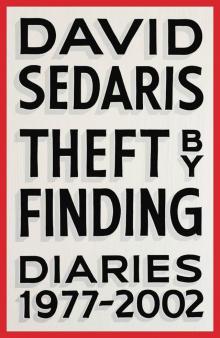 Theft by Finding
Theft by Finding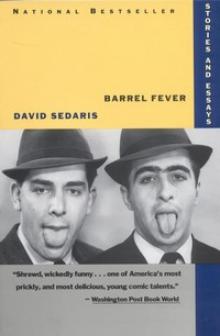 Barrel Fever and Other Stories
Barrel Fever and Other Stories